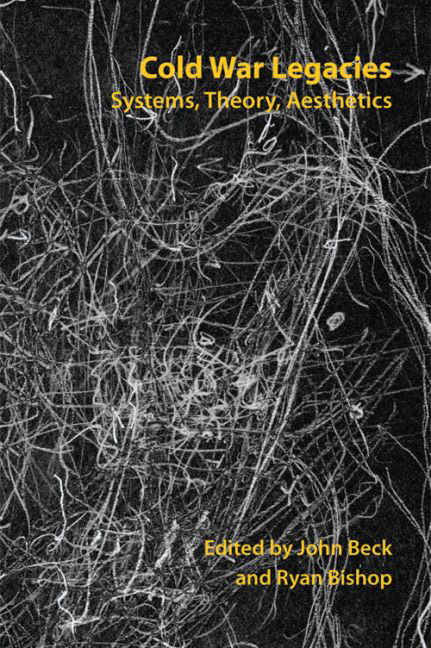Book contents
- Frontmatter
- Contents
- List of Figures
- Series Editors’ Preface
- Acknowledgements
- Notes on Contributors
- Introduction: The Long Cold War
- I PATTERN RECOGNITION
- II THE PERSISTENCE OF THE NUCLEAR
- III UBIQUITOUS SURVEILLANCE
- IV PERVASIVE MEDIATIONS
- 11 Notes from the Underground: Microwaves, Backbones, Party Lines and the Post Offi ce Tower
- 12 Insect Technics: War Vision Machines
- 13 Overt Research
- 14 Smart Dust and Remote Sensing: The Political Subject in Autonomous Systems
- Index
11 - Notes from the Underground: Microwaves, Backbones, Party Lines and the Post Offi ce Tower
from IV - PERVASIVE MEDIATIONS
Published online by Cambridge University Press: 10 May 2017
- Frontmatter
- Contents
- List of Figures
- Series Editors’ Preface
- Acknowledgements
- Notes on Contributors
- Introduction: The Long Cold War
- I PATTERN RECOGNITION
- II THE PERSISTENCE OF THE NUCLEAR
- III UBIQUITOUS SURVEILLANCE
- IV PERVASIVE MEDIATIONS
- 11 Notes from the Underground: Microwaves, Backbones, Party Lines and the Post Offi ce Tower
- 12 Insect Technics: War Vision Machines
- 13 Overt Research
- 14 Smart Dust and Remote Sensing: The Political Subject in Autonomous Systems
- Index
Summary
To isolate an ideal form is to render it independent of the empirical domain and of noise. Noise is the empirical form of the message just as the empirical domain is the noise of form.
Michel Serres (1968: 45)She had, as young people with their charming egoism and their impromptu modes so felicitously do, taken it quite calmly for granted that I should suddenly have felt like dining on the Post Office Tower and should, since she happened to ring up, have happened to ask her to come too.
Iris Murdoch (2013 [1973]: 241)Interruptions, interceptions, flights, losses, holes, trapdoors … these figures of the motif of parasitism link the parasite to that property of communication referred to as noise. Following Michel Serres, we may acknowledge three broad domains in which parasitical arrangements operate: biology (tapeworms and so on), community (with, in certain communities, a special sacrificial role) and communication (noise, static, interference). As Serres observes, what was classically the biological sense involves a parasitical animal that ‘lives, eats, and multiplies within the body of its host’ (1980: 9). Yet this can seem to be a wide rubric: ‘We adore eating veal, lamb, beef, antelope, pheasant, or grouse, but we don't throw away their leftovers. We dress in leather and adorn ourselves with feathers’ (Serres 1980: 10). Serres's thought on the parasite, beginning with his multi-volume work Hermès(1968), and reaching a more sustained level in Le parasite(1980), helps to identify the paradoxical continuity of the parasitic structure across all its domains, thus transforming it in its concept. Any system whatever that involves as a condition of its operation the possibility of its interruption can be said to be essentially parasitic: ‘This system includes the telephone, the telegraph, television, the highway system, maritime pathways and shipping lanes, the orbits of satellites, the circulation of messages and of raw materials, of language and foodstuffs, money and philosophical theory’ (Serres 1980: 11). It is with this last category that Serres begins his investigation.
The first volume of Hermès, La communication, begins with a reading of the role of mathematics for Platonic dialogue, considered as an instance of the genesis of intersubjectivity and abstraction.
- Type
- Chapter
- Information
- Cold War LegaciesLegacy, Theory, Aesthetics, pp. 213 - 233Publisher: Edinburgh University PressPrint publication year: 2016



